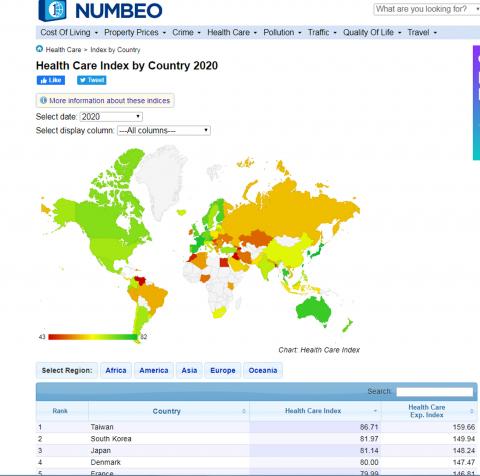Taiwan’s healthcare system has been ranked No. 1 in the world for a second year, according to an online survey.
With a score of 86.71 out of 100, Taiwan ranked first among 93 countries, the Health Care Index by Country released by online database Numbeo showed.
South Korea and Japan were closely behind Taiwan, with 81.97 and 81.14 points respectively.

Photo: screen grab from the Internet
Denmark, France, Spain, Austria, Thailand, Australia and Finland followed, rounding out the top 10. China ranked No. 47 with a score of 64.48.
Venezuela finished at the bottom of the list with a score of 39.66.
Taiwan also ranked first last year, with a score of 86.22.
The country ranked second behind South Korea in the 2018 survey, which was first conducted in 2012.
The results are based on surveys from visitors to its Web site who were asked to score overall quality of healthcare in their countries, Numbeo said.
In August last year, the Health Care Index compiled by CEOWORLD Magazine, an online business magazine and news site, ranked Taiwan’s healthcare system the best out of 89 countries surveyed.
The magazine said its index measured the overall quality of healthcare systems, including infrastructure, competencies of professionals, and cost and availability of quality medicine.
Taiwan’s healthcare system scored 78.72 out of 100.
Three other Asian nations — South Korea (second), Japan (third) and Thailand (sixth) — were also in the top 10.

CHANGING LANDSCAPE: Many of the part-time programs for educators were no longer needed, as many teachers obtain a graduate degree before joining the workforce, experts said Taiwanese universities this year canceled 86 programs, Ministry of Education data showed, with educators attributing the closures to the nation’s low birthrate as well as shifting trends. Fifty-three of the shuttered programs were part-time postgraduate degree programs, about 62 percent of the total, the most in the past five years, the data showed. National Taiwan Normal University (NTNU) discontinued the most part-time master’s programs, at 16: chemistry, life science, earth science, physics, fine arts, music, special education, health promotion and health education, educational psychology and counseling, education, design, Chinese as a second language, library and information sciences, mechatronics engineering, history, physical education

The Chinese military has boosted its capability to fight at a high tempo using the element of surprise and new technology, the Ministry of National Defense said in the Quadrennial Defense Review (QDR) published on Monday last week. The ministry highlighted Chinese People’s Liberation Army (PLA) developments showing significant changes in Beijing’s strategy for war on Taiwan. The PLA has made significant headway in building capabilities for all-weather, multi-domain intelligence, surveillance, operational control and a joint air-sea blockade against Taiwan’s lines of communication, it said. The PLA has also improved its capabilities in direct amphibious assault operations aimed at seizing strategically important beaches,

‘MALIGN PURPOSE’: Governments around the world conduct espionage operations, but China’s is different, as its ultimate goal is annexation, a think tank head said Taiwan is facing a growing existential threat from its own people spying for China, experts said, as the government seeks to toughen measures to stop Beijing’s infiltration efforts and deter Taiwanese turncoats. While Beijing and Taipei have been spying on each other for years, experts said that espionage posed a bigger threat to Taiwan due to the risk of a Chinese attack. Taiwan’s intelligence agency said China used “diverse channels and tactics” to infiltrate the nation’s military, government agencies and pro-China organizations. The main targets were retired and active members of the military, persuaded by money, blackmail or pro-China ideology to steal

DEADLOCK: As the commission is unable to forum a quorum to review license renewal applications, the channel operators are not at fault and can air past their license date The National Communications Commission (NCC) yesterday said that the Public Television Service (PTS) and 36 other television and radio broadcasters could continue airing, despite the commission’s inability to meet a quorum to review their license renewal applications. The licenses of PTS and the other channels are set to expire between this month and June. The National Communications Commission Organization Act (國家通訊傳播委員會組織法) stipulates that the commission must meet the mandated quorum of four to hold a valid meeting. The seven-member commission currently has only three commissioners. “We have informed the channel operators of the progress we have made in reviewing their license renewal applications, and